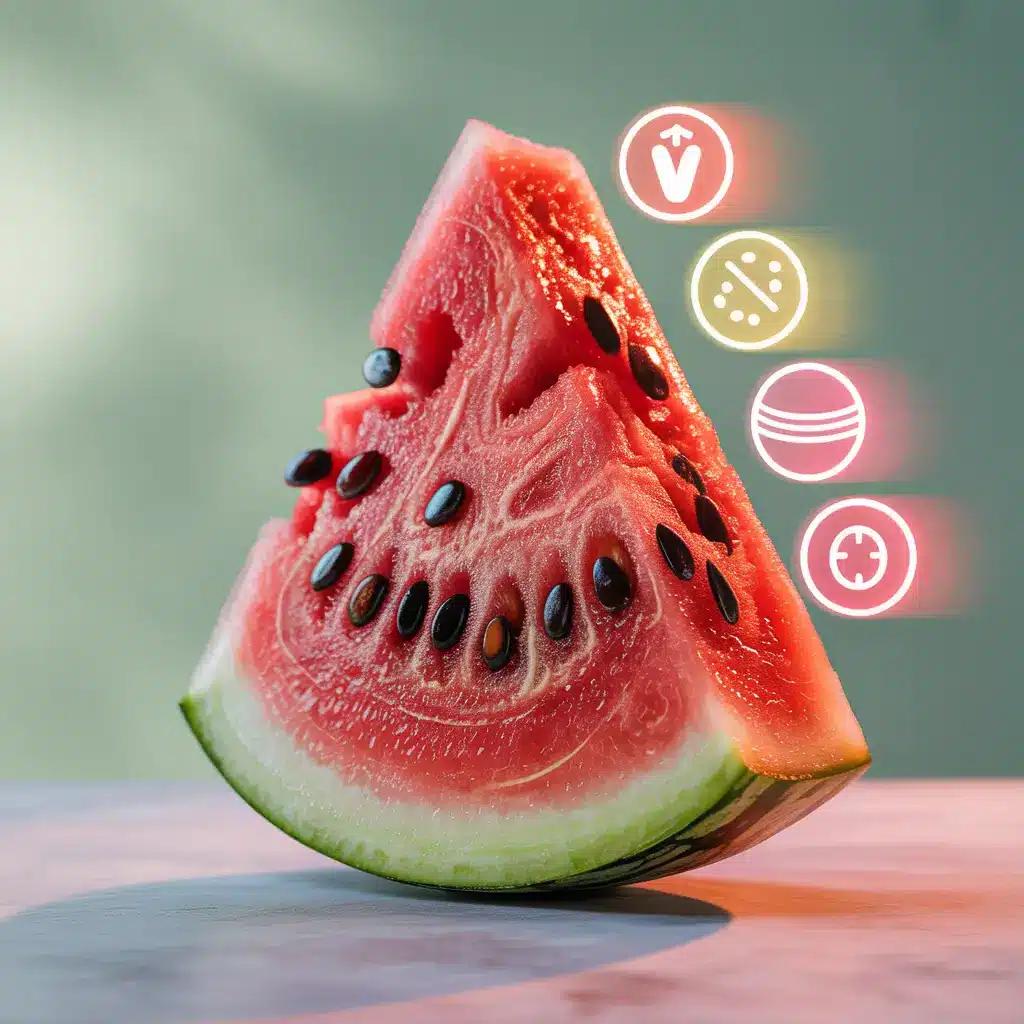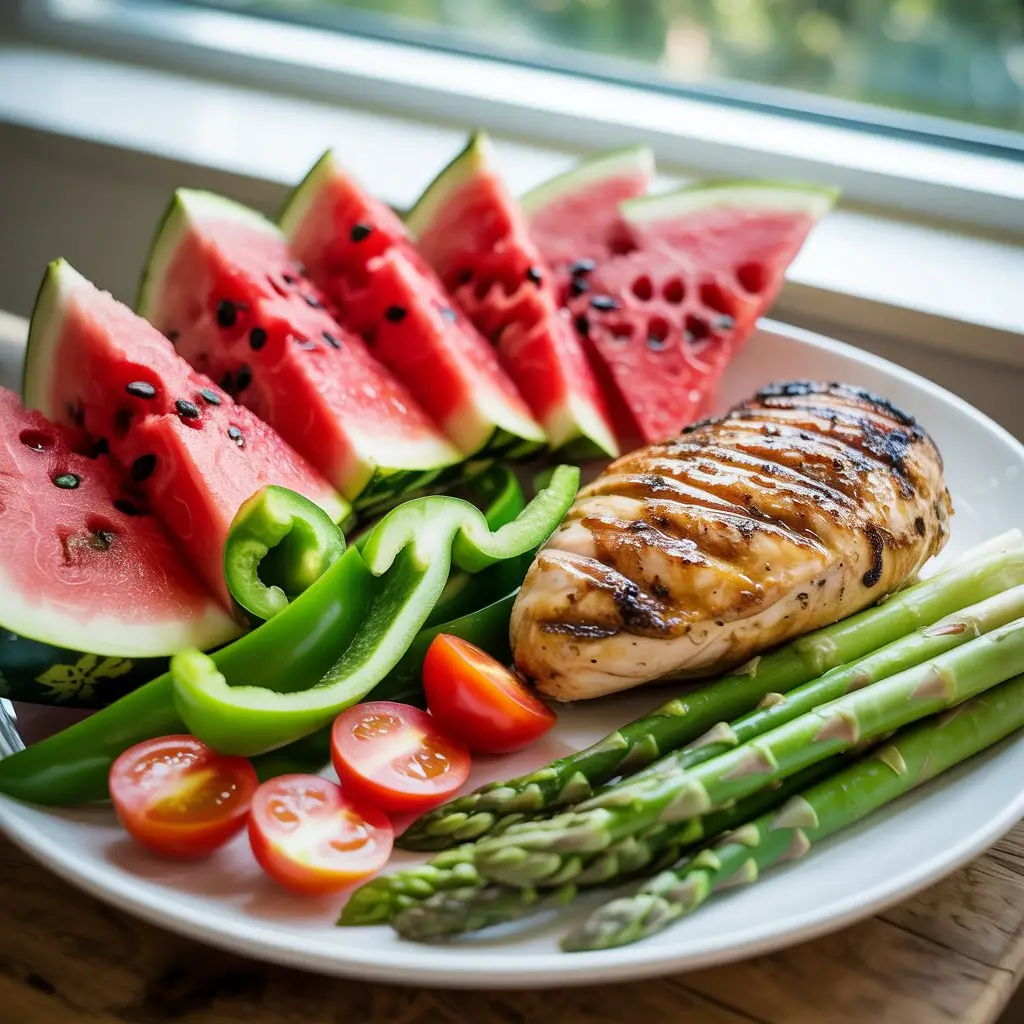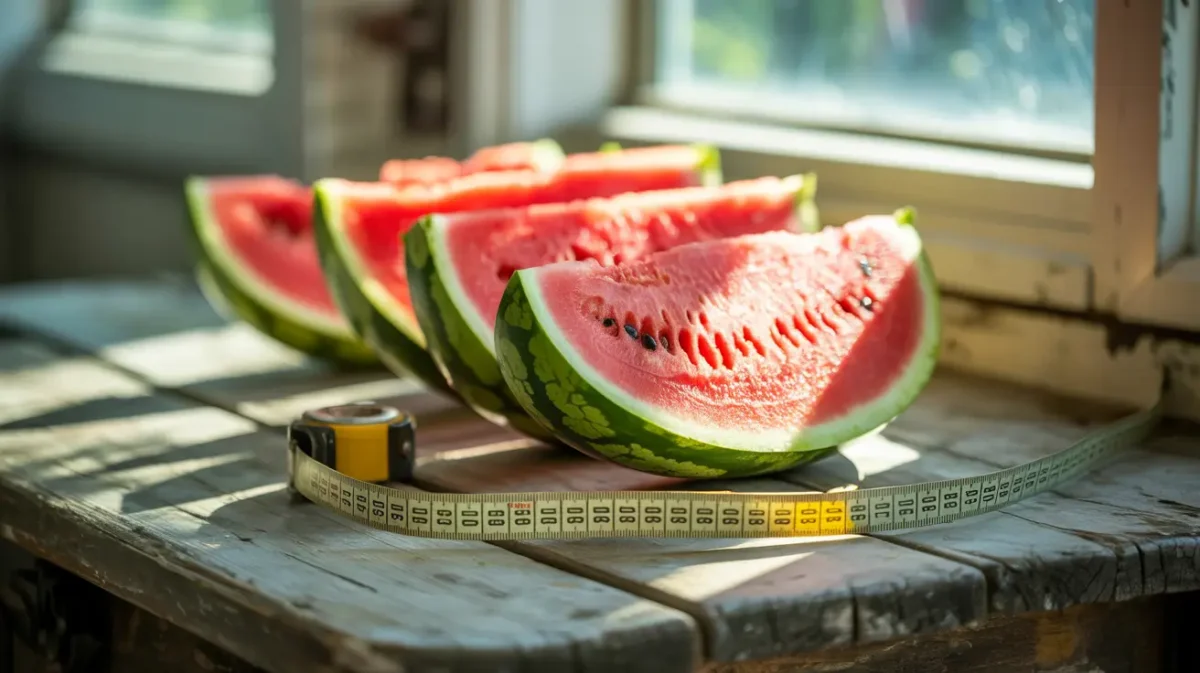introduction
Does a watermelon diet work and really help with weight loss and belly fat? This trendy plan grabs attention because watermelon is hydrating, low in calories, and packed with vitamins. While it may bring quick results, experts warn there are both pros and cons.
In this guide, we’ll explain what the watermelon diet is, how it affects your body, whether it reduces belly fat, and safer long-term alternatives. You’ll also find meal ideas, a 7-day plan breakdown, and tips for healthy weight loss.
Remember, no single fruit can replace a balanced diet. The goal is to make sustainable choices that fit your lifestyle. Don’t miss our in-depth Watermelon Detox Diet article if you want to see how this fruit became a social media diet craze.
table of contents
Table of Contents
What is the “Watermelon Diet” and Why People Try It
The watermelon diet has become one of the most talked-about fruit-based eating plans, especially during summer months. At its simplest, the diet involves replacing regular meals with watermelon for a set period. In its strictest form, people eat only watermelon for three days. Other variations, such as the 7-day watermelon diet, begin with a “watermelon-only” phase before gradually adding lean proteins, vegetables, and whole grains. The goal is straightforward: create a calorie deficit while still feeling full.
Watermelon’s appeal lies in its nutritional profile. With about 92% water and just 46 calories per cup, it offers volume without a heavy calorie load. That makes it possible to eat large servings, stay hydrated, and still maintain a low daily calorie intake. Watermelon also provides antioxidants like lycopene and nutrients such as potassium, which support overall health. For those looking for balanced snack alternatives, our Guide to Budget Friendly Protein Snacks offers creative options that pair well with fruit-based meals.
The rise of this watermelon diet is also linked to social media trends. Influencers often market watermelon as a “detox” food, claiming it helps flush toxins and even burn belly fat. While science doesn’t support those claims—spot reduction isn’t possible—the diet’s simplicity makes it attractive. No cooking, no complex grocery list, just a refreshing fruit many people already love. To explore additional fruit-focused recipes and healthy meal inspiration, sites like HighTasty offer practical ideas that don’t rely on extreme restrictions.
Nutritional Profile of watermelon diet (Why It Matters for Weight Loss)

When asking does a watermelon diet work, one of the first things to consider is its nutritional value. Watermelon is often thought of as just a sweet summer fruit, but it offers a surprisingly well-rounded profile that plays into weight management.
A single cup of diced watermelon contains only about 46 calories, making it one of the lowest-calorie fruits you can eat. It is made up of roughly 92% water, which helps with hydration and gives a sense of fullness that may naturally reduce overall calorie intake. Along with hydration, watermelon provides small amounts of dietary fiber that can aid digestion and help stabilize appetite.
Beyond calories, watermelon delivers important micronutrients. It’s a good source of vitamin C, which supports immune health, and vitamin A, which benefits skin and vision. The fruit also contains potassium, an essential electrolyte that helps regulate blood pressure and muscle function. One standout compound in watermelon is lycopene, a powerful antioxidant that has been studied for its potential role in heart health and reducing oxidative stress.
The amino acid citrulline, also present in watermelon, has been linked to improved blood flow and exercise recovery, adding another layer of benefit for people who are active. For those looking to use watermelon in weight loss recipes, our High Protein Low Fat Dessert Recipe shows how fruit can be paired with protein for better balance. You can also explore more about fruit-based nutrition and recipes at HighTasty, which provides creative inspiration beyond restrictive diets.
Short-Term Effects — Does Eating Mostly watermelon diet Cause Weight Loss?
When people first wonder, does a watermelon diet work, they’re usually hoping for quick results. In the short term, eating mostly watermelon can indeed lead to weight loss. This happens for a few key reasons. First, watermelon is extremely low in calories, so even if you eat large portions, your daily intake will likely fall below what your body needs. That calorie deficit often shows up as rapid weight reduction on the scale.
Second, much of the early loss comes from water weight. Because watermelon is about 92% water and very low in sodium, watermelon diet acts as a natural diuretic, flushing excess fluids from the body. While this can make your stomach feel flatter, it doesn’t represent fat loss. Additionally, cutting back on carbs while eating mostly fruit lowers glycogen stores, which also leads to a temporary drop in water weight.
However, there are downsides. Relying only on watermelon for several days can leave your body short on protein, healthy fats, and other essential nutrients. Without these, muscle loss and fatigue can occur, which makes long-term weight management harder. That’s why experts suggest using watermelon as part of a balanced eating plan rather than the sole focus. For healthier ideas, don’t miss our Creami Recipes for Weight Loss, which combine fruits with protein for sustained results. You can also check Pinterest for creative watermelon meal inspirations shared by food lovers worldwide.
Risks and Downsides of an All–Watermelon Diet
While many wonder, does a watermelon diet work, it’s equally important to weigh the risks. Eating nothing but watermelon diet may sound harmless, but this extreme plan comes with notable drawbacks.
The biggest issue is nutrient deficiency. Watermelon is almost entirely carbohydrates and water, with very little protein or fat. Over time, this imbalance can lead to muscle loss, fatigue, and slower metabolism. Protein is essential for preserving lean mass, while healthy fats support hormones and brain health—both missing from a fruit-only plan.
Digestive concerns are another risk. Watermelon is high in natural sugars, including fructose. For those sensitive to fructose, eating large amounts can trigger bloating, cramps, or diarrhea. The fruit’s diuretic effect, while helpful for reducing water retention in the short term, can also increase the chance of electrolyte imbalances if consumed excessively.
Another downside is sustainability. A restrictive diet that cuts out entire food groups is difficult to maintain and may encourage rebound eating once normal meals are reintroduced. This yo-yo pattern often leads to regaining the lost weight—and sometimes more. For better balance, you might try pairing watermelon with lean proteins or healthier desserts. Our Ninja Creami Protein Ice Cream offers a refreshing treat that combines flavor with essential nutrients missing from fruit-only diets. To explore additional insights on healthy eating trends, you can follow discussions and updates on Facebook, where wellness communities often break down the risks of fad diets.
The 7-Day Watermelon Diet Explained (Sample Plan + Variations)

Many people asking does a watermelon diet work eventually come across the 7-day watermelon diet, which is one of the most popular variations of this plan. It typically begins with a strict phase, followed by a gradual reintroduction of other foods.
In the first one to three days, participants eat only watermelon in unlimited amounts. This phase is marketed as a “detox,” though science shows it mainly results in water loss and calorie reduction rather than toxin elimination. From day four onward, lean proteins such as chicken or fish, along with vegetables and whole grains, are slowly added back to create a more balanced eating plan. By the end of the week, watermelon remains the centerpiece of meals but no longer the sole food.
A sample day on the balanced phase might look like this:
- Breakfast: watermelon smoothie with Greek yogurt
- Lunch: grilled chicken breast with a side of watermelon salad
- Snack: fresh watermelon slices
- Dinner: salmon with vegetables and a small watermelon salsa
While the structure is simple, watermelon diet is not sustainable long-term. The initial restriction may cause nutrient gaps, and most weight lost is regained once regular eating resumes. For smarter ways to enjoy fruit in your diet, check out our Air Fryer Protein Donut Holes, which pair indulgence with balanced nutrition. You can also explore creative fruit-forward meal ideas on High Tasty to keep your diet both satisfying and varied.
Can Watermelon diet Specifically Reduce Belly Fat? (Targeted Fat Loss Myths)
One of the biggest reasons people ask does a watermelon diet work is the hope that it can melt away stubborn belly fat. The idea sounds appealing—eat a low-calorie, hydrating fruit and watch your waistline shrink. But in reality, the concept of spot reduction is a myth. No single food, including watermelon, can directly burn fat from a specific area of the body.
Belly fat, particularly visceral fat stored around the organs, decreases only when overall body fat is reduced through a consistent calorie deficit. Watermelon can support this process because it’s filling, hydrating, and naturally low in calories, helping you eat less without feeling deprived. However, relying solely on watermelon misses the bigger picture of balanced nutrition. Pairing it with protein and fiber-rich foods is more effective for reducing total body fat and, eventually, trimming the waistline.
Some studies suggest that compounds in watermelon, such as citrulline and lycopene, may benefit heart health and metabolism, but the evidence is not strong enough to claim direct belly fat reduction. Instead, experts recommend combining healthy eating with regular exercise for noticeable results. For creative ways to make fruit a sustainable part of your plan, see our Legendary Protein Donut, which shows how indulgent foods can be adapted to support weight management. You can also find fresh belly-friendly recipe inspiration on Pinterest, where thousands of fitness enthusiasts share practical meal ideas.
Practical watermelon diet Tips for Losing Belly Fat in 2 Weeks (Realistic, Healthy Strategy)

Many people wonder, does a watermelon diet work fast enough to slim down their midsection in just two weeks. While no diet can magically target belly fat, combining smart nutrition with lifestyle changes can help you see measurable results in that time frame.
The foundation is creating a calorie deficit without sacrificing nutrition. Watermelon can be part of this process because it’s low in calories and filling, but it shouldn’t replace all meals. Instead, aim to pair it with lean protein and fiber to keep hunger under control and preserve muscle mass. Options like grilled chicken, beans, or Greek yogurt balance the natural sugars in fruit and make meals more satisfying. For dessert ideas that align with this approach, explore our High Protein Low Fat Dessert Recipe, which delivers sweetness with better nutrition.
Exercise is another essential element. Combining strength training with cardio helps accelerate fat loss and improve body composition. Even 20–30 minutes of daily movement—like brisk walking, bodyweight exercises, or cycling—can make a difference in two weeks.
Don’t overlook lifestyle habits. Poor sleep and high stress can raise cortisol levels, which may contribute to abdominal fat storage. Aiming for 7–8 hours of quality sleep and practicing stress-relieving activities like yoga or meditation can support your physical efforts. For additional practical wellness ideas, HighTasty shares accessible meal and lifestyle tips designed to keep you on track.
Recipes & Meal Ideas — Enjoy Watermelon diet Without Risking Nutrition
If you’re asking, does a watermelon diet work, the good news is that watermelon can definitely play a role in weight management—when it’s part of a balanced plan. Instead of eating only watermelon, the smarter approach is to use it in creative recipes that combine protein, fiber, and healthy fats for lasting satisfaction.
Here are a few meal ideas that highlight watermelon without sacrificing nutrition:
- Watermelon Salad with Feta & Grilled Chicken: The protein balances the natural sugars, while feta adds flavor and calcium.
- Watermelon Smoothie with Greek Yogurt: A refreshing breakfast that combines hydration with probiotics and protein.
- Chilled Watermelon Soup: Blended with cucumber and mint, this makes a low-calorie appetizer rich in antioxidants.
- Watermelon Salsa with Grilled Fish: A zesty topping that brings sweetness and crunch to lean proteins.
- Watermelon & Cottage Cheese Bowl: A quick snack packed with protein, hydration, and a touch of creaminess.
These recipes show that you don’t have to go to extremes to enjoy watermelon while working toward weight loss goals. Pairing fruit with protein ensures better blood sugar balance and helps preserve lean muscle. For additional balanced recipe ideas, see our Creami Recipes for Weight Loss, which provide creative ways to enjoy sweet treats without the nutritional gaps of a strict fruit diet. You can also find seasonal watermelon recipes and healthy cooking inspiration on Pinterest, where food creators share fresh meal ideas daily.
FAQs (PAA) — Quick, Evidence-Based Answers
Would I lose weight if I just ate watermelon?
Yes, but mostly short-term. Watermelon is low in calories, so replacing meals with it creates a calorie deficit. However, most of the loss is water and muscle, not fat. (Healthline)
Will watermelon help you lose belly fat?
Not directly. The concept of spot reduction is a misconception—your body doesn’t shed fat from one targeted area. Instead, fat loss takes place gradually throughout the entire body. Watermelon may help overall calorie control, which can reduce waist size over time. (University of Sydney)
What is the 7-day watermelon diet?
It’s a plan where you eat mostly watermelon for several days, then slowly add back protein and vegetables. While popular, it’s restrictive and not backed by science. (Healthline)
How to lose belly fat in 2 weeks?
Focus on a calorie deficit, protein, fiber, exercise, sleep, and stress control. These combined can slim your midsection faster. (Harvard Health)
Is watermelon safe for people with diabetes?
In moderation, yes. It contains natural sugars and a moderate glycemic index. Pairing it with protein or healthy fats helps manage blood sugar. (Yeditepe University Hospitals)
What are the side effects of eating watermelon every day?
Overeating may cause bloating, diarrhea, or electrolyte imbalance. Relying only on watermelon risks nutrient gaps. Moderate intake is safe. (Healthline)
Conclusion: Does a Watermelon Diet Work?
So, does a watermelon diet work? Yes, but only in the short term. Eating mostly watermelon creates a calorie deficit and flushes water weight, which can make the scale drop quickly. However, this effect doesn’t equal lasting fat loss.
Watermelon is naturally healthy: it’s low in calories, hydrating, and full of antioxidants. Used wisely, it can help curb cravings and support weight management. But as the sole focus of your meals, it falls short, leaving your body without essential protein, fats, and nutrients.
For long-term results, watermelon works best as part of a balanced plan that includes lean proteins, vegetables, exercise, sleep, and stress control. Enjoy it in salads, smoothies, or snacks—but don’t rely on it alone to reach your goals.

